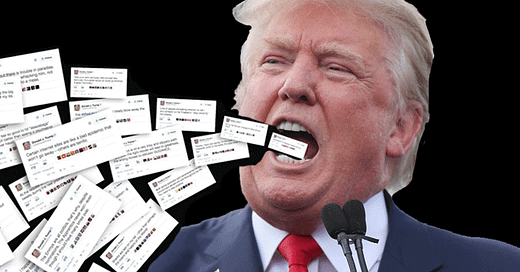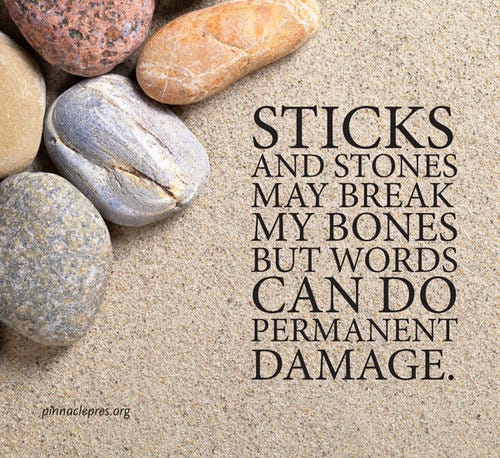Sticks and Stones
As a child, you're taught that "sticks and stones may break my bones, but words will never hurt me." At least, children used to be taught that. But it seems that there is an opposing attitude in our culture today: today it often seems that we are more concerned about words than about sticks and stones. I have two thoughts about this: (a) the concern about words is overdrawn, (b) but words are still important.
A. Bombing vs. Tweeting: Which Is Worse?
Case in point: the current Tweeter-in-Chief. I think it safe to say that he has drawn more ire than any other President, or indeed any other public figure, in my lifetime. Most of the expressions of horror at Trump are about something that he said, or rather tweeted. People are angry because his words were racist, sexist, or otherwise offensive. Of course, that is not the only sort of criticism the Chief Tweeter gets, but it does seem to be the most common.
This might seem odd, because on its face tweeting is a very low-importance activity, among the things that Presidents do. One might expect, for example, that the wars the U.S. has engaged in over the past two decades would generate far more outrage than a bunch of stupid tweets.
I know that some people thought those wars were justified, so they wouldn't be outraged. But I think it is pretty widely accepted among Democrats, especially those most outraged by Trump, that the Iraq war was unjustified, and probably also that we've spent too long in Afghanistan. Obama ordered bombings in seven different countries (https://www.cnn.com/2014/09/23/politics/countries-obama-bombed/index.html) and started a program of extrajudicial assassination. Granted, Obama spoke in a calm and polite voice and stayed off Twitter while he was bombing people, which I guess is an advantage. Still, shouldn't we find these issues many orders of magnitude more important than the tweets?
You might think that Democrats refrained from criticizing Obama's hawkishness due to pure partisanship. But what about Bush? Bush certainly came in for heavy criticism (at the time, I thought it the heaviest criticism of a political figure I had seen to date), but the anger at Bush now seems mild by comparison to the outrage many feel toward Donald Trump.
That's weird, isn't it? The Iraq war killed hundreds of thousands of civilians and paved the way for ISIS to take over. Trump's tweets haven't done anything like that. I assume that most Trump-haters would agree that starting the Iraq war was morally far, far worse than all of Trump’s tweets. (?) But it looks to me like the emotional reaction to the latter is greater.
To some extent, we just have to admit, “Yeah, we humans are irrational.” Maybe what’s going on is that the Iraq war was a crime against an outgroup, a bunch of foreigners. The tweets are something Trump is doing to us, causing us to feel offense. (But the Iraq war also killed thousands of U.S. soldiers. But perhaps we don’t care as much about that, because we aren’t soldiers.) Or maybe it’s that the most outraged people are people who care mainly about crimes against an ideology, and less about ordinary, non-ideological harms against actual humans.
Or it’s just that we care more about how polite a person is than how moral they are. You can be a mass murderer and still be popular, as long as you are polite.
B. Talk Matters
Be that as it may, however, I want to say that it’s not unreasonable to be concerned about words. We may be overreacting (and we underreacted to the recent wars), but it is actually important how public figures talk. We are not just being frivolous. Here is why talk matters.
Human beings are far more driven by culture than by morality. If an action is obviously immoral but it is accepted in one’s culture, almost everyone will do it without compunction. (Example: buying meat from factory farms.) If an action is against the culture but obviously perfectly morally permissible, then few people will do it. (Example: walking around wearing a cape.) Cultural norms are even more influential than the law. (Example: there is a tradition of breaking the speed limit, so no one feels bad about it.)
A big part of how people learn what the cultural norms are is from how people around them talk, and the attitudes they express thereby. We learn how to interact with each other by observing each other talking to each other – not, e.g., by hearing about what the government’s policies are. Sometimes values are explicitly stated, but more often they are communicated implicitly by the emotional reactions people appear to express. E.g., what people appear to be embarrassed about communicates information about what is socially disapproved; the way we talk to each other communicates how we regard each other.
In all this, I conjecture, people who have prominent, high-status social positions are more influential. The social norms are taken to be the ones accepted by the socially dominant people; less dominant people follow their lead.
Now about Trump in particular:
The U.S. President is a paradigm example of a prominent, high-status figure.
The way Trump talks is far out of the previous mainstream for public figures. It thus has the potential to alter perceptions of what the culture is. His mode of talking and his attitudes create a second stream in what was previously a fairly unified elite culture.
This influence is not going to be good. Because Trump’s values, if one can so describe them, are closer to those of primitive dictators than to what we used to think of as American values.
I once read a story about some Iraqi leaders who visited the U.S. to see how government is run here. According to the story, they viewed some legislative sessions, maybe a city council meeting, and what they were most struck by was how respectfully everyone disagreed. That is part of how things go in well ordered societies. But respectful discourse can be broken down by one or a few people starting in with insults – then other parties follow suit. Then when ordinary people see the elites trading personal attacks, they learn that this is a culture in which we don’t respect each other – that that’s the norm.
Other lessons that people may be learning: we don’t value objectivity, or any form of truthfulness, in this culture. Naked egoism and egotism are acceptable. We blatantly troll people who are “on the other side” rather than engaging in serious discussion. We don’t have any particular problem with violence.
I here focus on things that ordinary, non-politicians might imitate; they won’t imitate government policies, since they don’t have any such power.
C. In Praise of Hypocrisy
Political leaders often violate the values of society with their policies. For instance, violating the norm against murder by bombing civilians. They also regularly steal and coerce, of course, as that is the main business of government. When they do these things, traditionally, they give some hypocritical rationalizations. They would always deny that they are committing murder and theft. They would insist that they and the rest of the government hold to the highest ideals.
Of course, smart, informed people know that the politicians are lying. But that hypocrisy communicates something. The fact that you say you are committed to freedom, or respect for all human life, etc., while you’re oppressing and killing people, communicates to ordinary observers something about what the norms of this society are. The social norms are that we value freedom, respect for life, etc., because the leaders would be too ashamed to admit that they were violating those ideals. What people feel they have to lie about communicates what the norms are – not what those people value, but what society values.
Remember the story of Jamal Khashoggi, who was murdered and cut into pieces in the Saudi consulate in Istanbul, on orders from the Saudi crown prince. Trump more or less communicated that he didn’t care about the murder, because Saudi Arabia is going to spend billions of dollars on U.S. military equipment. Some people on the internet immediately started “whatabout”ing – what about the crimes that occurred during the Obama administration?!, etc. Other people on Facebook found it “refreshing” that Trump was openly acknowledging that we don’t give a crap about murder as long as we’re getting money.
No, it is not refreshing. It is evil. And it’s horrifying that Americans would start minimizing murder, or trying to find the good side to openly tolerating murder. When did we become this? When did opposition to grisly murder become a partisan issue?
D. Reacting
I don’t think Trump and his enraged opponents can change the culture in the long term; I think the culture will gradually recover after he leaves office. But they are changing the culture in the short term.
What is the appropriate reaction? One school of thought is that we should loudly condemn Trump. If enough people do this, it will succeed in communicating the values of society. One person openly displaying lack of shame about anything surely can’t change the perception of the cultural norms, if everyone around that person is condemning him.
A problem I see with this thought is that there is not enough unity in society to do this. There are too many Trump supporters. So that when the mainstream elites are loudly condemning him, it just looks like they’re exemplifying the cultural norm, “Around here, we attack those on the other side of our political views with wild abandon.” Then you have a cycle of enraged attacks.
A similar question is how one should respond to unreasonable and destructive people on the left. One can respond by condemning them, but that might just set up a downward spiral of mutual attacks.
Another line of thought is that one should engage respectfully and reasonably, even with the disrespectful and unreasonable, and in that way demonstrate one’s continued adherence to the pre-Trump cultural norms, in an effort to strengthen them. Problem: this risks communicating acceptance of the unreasonable, etc., people's behavior.
Another approach is to refuse to engage with the unreasonable, dishonest, etc., thus avoiding the degenerating spiral of attacks while also avoiding communicating tolerance. Problem: this lets sufficiently unreasonable people put out there crazy claims without being contradicted.
What do you think is the best reaction?




